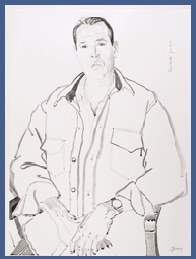 |

 aul
Monette viewed his prosperous and almost idyllic middle-class upbringing,
as shown in his family photographs, travel letters, and diploma
from Yale, in a critical light, a vantage he didn't express completely
until his National Book Award-winning memoir, Becoming a Man:
Half a Life Story (1992). aul
Monette viewed his prosperous and almost idyllic middle-class upbringing,
as shown in his family photographs, travel letters, and diploma
from Yale, in a critical light, a vantage he didn't express completely
until his National Book Award-winning memoir, Becoming a Man:
Half a Life Story (1992).
Monette considered that this first half of his life before he came out of the closet had no story: "For twenty-five years, I accepted the fact that nothing had ever happened to me and nothing ever would." His spirit was agonized because he couldn't tell the truth, but he wouldn't know how to speak if he could, because there were so few examples of how gay men might speak.
Becoming a Man details several stigma Monette suffered
from. These ranged from being gay, being working/middle-class (even
as he attended prestigious schools), and not being the All American
jock, to having a family tragedy. His brother was born with spina
bifida and suffered life-threatening illnesses as a child. Monette
considered that his academic overachievement was in reaction to
these difficulties, so that "Paul is perfect" noted on a report
card was an indication of striving in school to compensate for difficulties
elsewhere. Becoming the joking courtier or becoming the poet masked
the pain he felt or that he took upon himself for the tragedy that
struck his brother. "Becoming a man" or "becoming Paul Monette,"
as critic and biographer Chris Freeman has phrased it, would take
many years of work and change.
Becoming a Man was written when Paul Monette was dying
of AIDS. He composed the book on the computer and left no printed
manuscripts, such was the compelling haste of the project. The gay
press excerpted segments of the book, and Mark Thompson put Monette
on the cover of The Advocate. The mainstream press also
gave the book notice, with Lisa See conducting a Publishers
Weekly interview. It was reviewed widely and sold well. It
was nominated for the National Book Award and was chosen in a surprise
win.
The award catapulted him into the national limelight and earned even more readers and fan letters from readers. They often shared-some for the first time-their painful coming out stories. He answered many of these letters which are a compendium of gay life at the end of the twentieth century.
His notes for his award acceptance speech show his determination to continue his battle begun with his books about AIDS. He typed his first notes: "Is art political? Should it be?" He added in holograph: "Whose silence is it? Theirs v[ersu]s ours" His speech at the Library of Congress (traditional for winners of the award) extends and answers these questions: "It is not enough to be an artist. If you live in political times, if the lightning rod of history hits you in a certain way, then all art is political.." The speech distills many of his activist ideas in terse phrases, honed and rehearsed to deliver his urgent message in interviews, essays, and articles. He condenses his mature thinking on his gay writing, his activism, and, most of all, his philosophy that love is more important than writing.
Becoming a Man was written to help those with difficulty
coming out of the closet. Its influence continued when reprinted
in an English edition with a cover photograph by Bruce Weber. It
has been reprinted in the U.S. with an introduction by Kathryn Harrison
and remains in print and available as the classic that it is.

|
|

Paul
Monette on the cover of The Advocate
National Book Award Finalist certificate
National Book Award acceptance, leaf 1
National Book Award acceptance, leaf 2
Library of Congress talk transcript 1
Library of Congress talk transcript 2
British
edition of Becoming a Man
|

![]()
![]()
![]()
![]()

 aul
Monette viewed his prosperous and almost idyllic middle-class upbringing,
as shown in his family photographs, travel letters, and diploma
from Yale, in a critical light, a vantage he didn't express completely
until his National Book Award-winning memoir, Becoming a Man:
Half a Life Story (1992).
aul
Monette viewed his prosperous and almost idyllic middle-class upbringing,
as shown in his family photographs, travel letters, and diploma
from Yale, in a critical light, a vantage he didn't express completely
until his National Book Award-winning memoir, Becoming a Man:
Half a Life Story (1992).